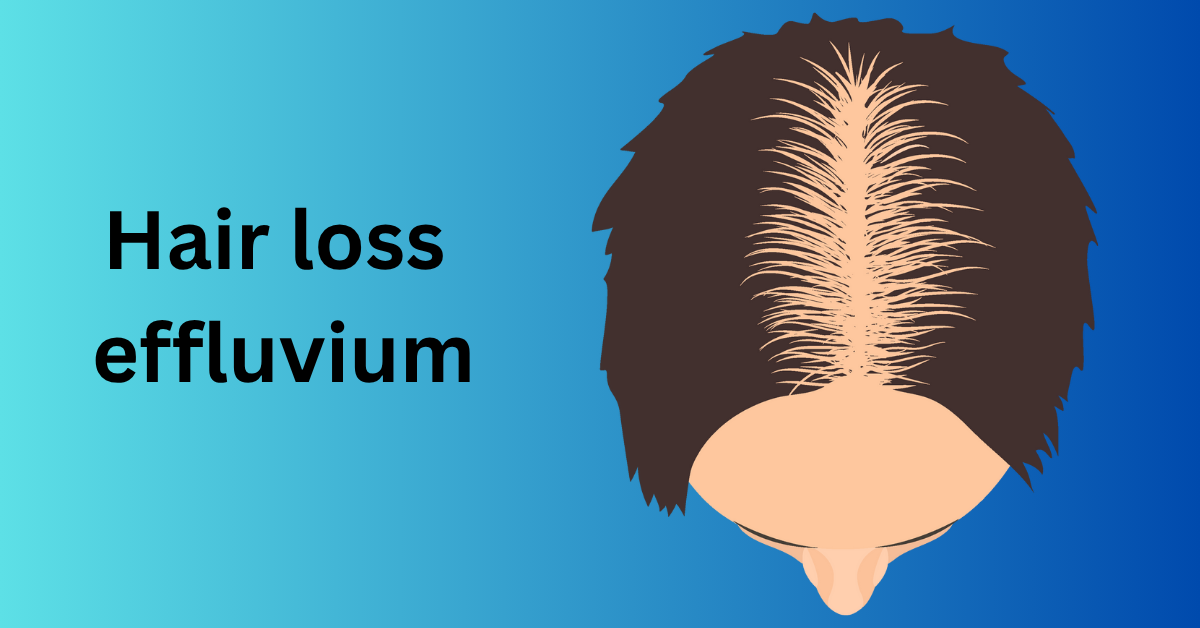Is your hair suddenly falling out in clumps? It might be more than just regular hair fall.
-
Hair Loss Effluvium (Telogen Effluvium) is a type of alopecia characterized by diffuse hair shedding.
-
What is telogen? Why is it called telogen effluvium?
- Naturally, our hair has a growth cycle
-
Anagen (Growth Phase) – hair grows (2 to 7years)
-
Catagen (Transition Phase) – the hair follicle stops growing and begins to shrink (2 to 3 weeks)
-
Telogen (Resting Phase) – a resting phase where the hair neither grows nor falls out. (2 to 3 months)
- Exogen (Shedding phase)–. This phase is often considered part of the telogen phase. In this phase, hair is shed from the scalp.
-
- In Telogen effluvium normal hair cycle is disturbed and causing more hair to be in the resting phase.
What is Hair Loss Effluvium?
-
Hair Loss Effluvium is a sudden shedding of hair caused by irregularities of the hair growth cycle, usually triggered by stress, illness, or nutritional deficiencies.
-
Telogen Effluvium
-
Telogen = Hair in resting phase
-
Effluvium = Sudden shedding
-
- Telogen Effluvium happens when a large number of your hair strands enter the resting phase at the same time, causing noticeable hair shedding.
-
Acute and Chronic Telogen Effluvium
-
The most affected ones are (women, post-illness, postpartum).
Common Causes of Hair Loss Effluvium
Break into subheadings for SEO:
Stress and Emotional Factors
-
Emotional stress, anxiety, depression, or major life changes
-
Physical stress: illness, surgery, high fever, or accident
- Telogen effluvium is triggered when physiologic stress causes a large number of hairs in the growing phase (anagen phase) of the hair cycle to abruptly enter the resting phase (telogen phase).
-
Corticosterone inhibits GAS6 to govern hair follicle stem-cell quiescenceCorticosterone inhibits GAS6 to govern hair follicle stem-cell quiescence.
Nutritional Deficiencies
-
Iron deficiency (most common)
-
Vitamin D, Vitamin B12, Zinc, Protein
-
Sudden weight loss or crash diets
Hormonal Imbalances
-
Postpartum hair loss
-
Thyroid disorders
-
PCOS and menopause
Illness or Infections
-
High fever illnesses (dengue, malaria, typhoid)
-
Post-COVID hair loss
-
Autoimmune disorders like lupus
Medications & Medical Treatments
-
Chemotherapy
-
Blood pressure medicines (beta-blockers)
-
Antidepressants, Isotretinoin
Hair Care & Environmental Factors
-
Excessive coloring, bleaching, and straightening
-
Heat styling and tight hairstyles
-
Pollution and chemical exposure
How to Identify Hair Loss Effluvium
Telogen Effluvium should be differentiate from alopecia areata, anagen effluvium, androgenetic alopecia, scarring alopecia, syphilis, and trichotillomania.
-
Sudden hair shedding 2–3 months after the trigger
-
Widening parting or thinning all over the scalp
-
Difference from genetic hair loss (no bald patches, just diffuse thinning)
5. Treatment and Prevention Tips
5.1 Manage Stress
-
Meditation, yoga, good sleep, and mental health support
5.2 Improve Nutrition
-
Iron-rich foods, protein, eggs, lentils, green leafy vegetables
-
Supplements, if prescribed by a doctor
5.3 Medical Checkup
-
Thyroid, iron, and vitamin levels
-
Consult a dermatologist if hair fall lasts >3 months
5.4 Gentle Hair Care
-
Avoid heat styling, tight hairstyles, and harsh chemicals
-
Use mild shampoo and nourishing oil
- Recent studies have also shown that both botulinum toxin A and multivitamin mesotherapy are effective in treating telogen effluvium.
Summarize: Hair Loss Effluvium is temporary and reversible if the underlying cause is treated.
Refrences
Nistico S, Tamburi F, Bennardo L, Dastoli S, Schipani G, Caro G, Fortuna MC, Rossi A. Treatment of telogen effluvium using a dietary supplement containing Boswellia serrata, Curcuma longa, and Vitis vinifera: Results of an observational study. Dermatol Ther. 2019 May;32(3):e12842. [PubMed]
Bin Dayel S, Hussein RS, Atia T, Abahussein O, Al Yahya RS, Elsayed SH. Is thyroid dysfunction a common cause of telogen effluvium?: A retrospective study. Medicine (Baltimore). 2024 Jan 05;103(1):e36803. [PMC free article] [PubMed]
Sant’Anna Addor FA, Donato LC, Melo CSA. Comparative evaluation between two nutritional supplements in the improvement of telogen effluvium. Clin Cosmet Investig Dermatol. 2018;11:431-436. [PMC free article] [PubMed]
“The main goal is to understand Telogen Effluvium, take care of your self, stay stressfree, eat healthy, and get help from a healthcare practioner before it gets worse.”

